Key takeaways:
- Procrastination often stems from fear and a lack of clarity, making it essential to break tasks into manageable steps to overcome it.
- Setting specific deadlines and eliminating distractions can significantly enhance productivity and creativity.
- Celebrating small victories fosters motivation and reinforces a positive relationship with the creative process.
- Music not only serves as a motivational tool but also helps create an environment conducive to focus, enhancing productivity.
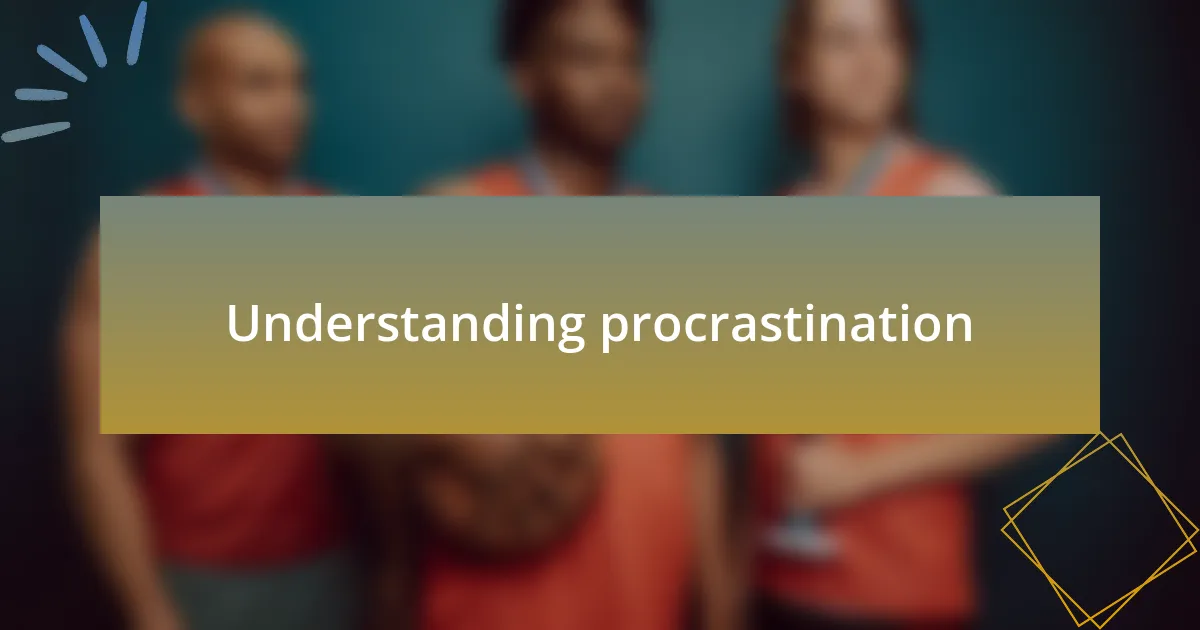
Understanding procrastination
Procrastination is often more than just a bad habit; it’s a complex emotional response. I remember a time when I had a significant deadline approaching for a music project. Instead of diving in, I found myself endlessly scrolling through playlists. I think it’s fascinating how we sometimes choose distraction over doing something that truly matters. Have you ever experienced that gut-wrenching feeling of knowing you should be working but can’t bring yourself to start?
Digging deeper, I’ve realized that fear often fuels my procrastination. Last year, I hesitated to submit a song for an award because I was afraid of criticism. This fear, I’ve found, can create a paralyzing cycle: the longer I wait, the greater the anxiety grows. I wonder if others feel that weight, too. Do we all face that moment when self-doubt whispers, “What if it’s not good enough?”
Understanding procrastination also means acknowledging the underlying reasons behind it. For me, I’ve discovered that sometimes it stems from a lack of clarity – when I don’t know where to begin, I freeze. There have been moments when simply breaking a task into smaller steps made all the difference, like focusing only on writing one verse instead of an entire song. Does that resonate with you? It turns out that the first step often holds the most power.
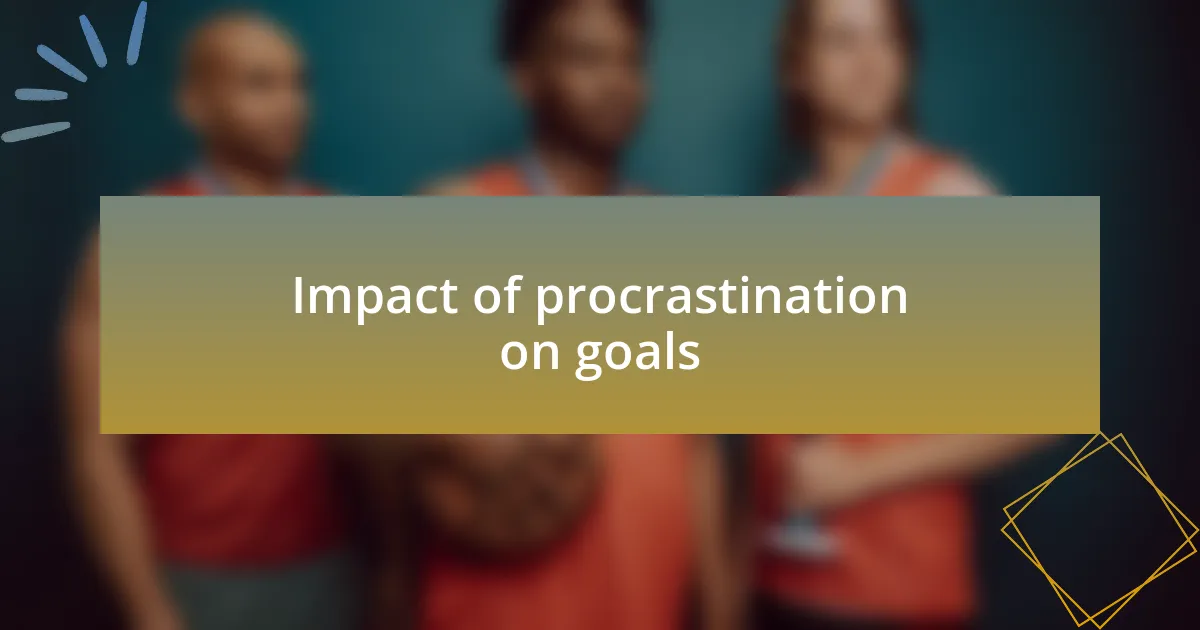
Impact of procrastination on goals
Procrastination can have a significant impact on pursuing our goals, especially in creative fields like music. I recall a project where I delayed starting a collaborative song for weeks. As a result, my partner lost enthusiasm, and the energy we could have created together faded away. Have you ever noticed that a missed timeline can sometimes shatter the momentum needed to keep that creative spark alive?
When procrastination takes hold, it not only stalls progress but also sours our motivation. For instance, there was a time when I put off practicing for an important performance. As the day drew closer, I found myself feeling frantic and unprepared. That sense of dread can be overwhelming, can’t it? It made me realize how easily procrastination can shift from a simple choice to a full-blown anxiety spiral, creating doubts that affect not just my performance but my confidence as a whole.
Ultimately, procrastination complicates our journey toward achieving our dreams. The longer we put off our ambitions, the less clarity we gain about them. I remember delaying the launch of my own music video, which left me questioning whether I truly believed in my work. Isn’t it interesting how procrastination not only hinders immediate goals but can also impact our long-term aspirations? Each instance taught me that time is often the enemy when it comes to chasing dreams.
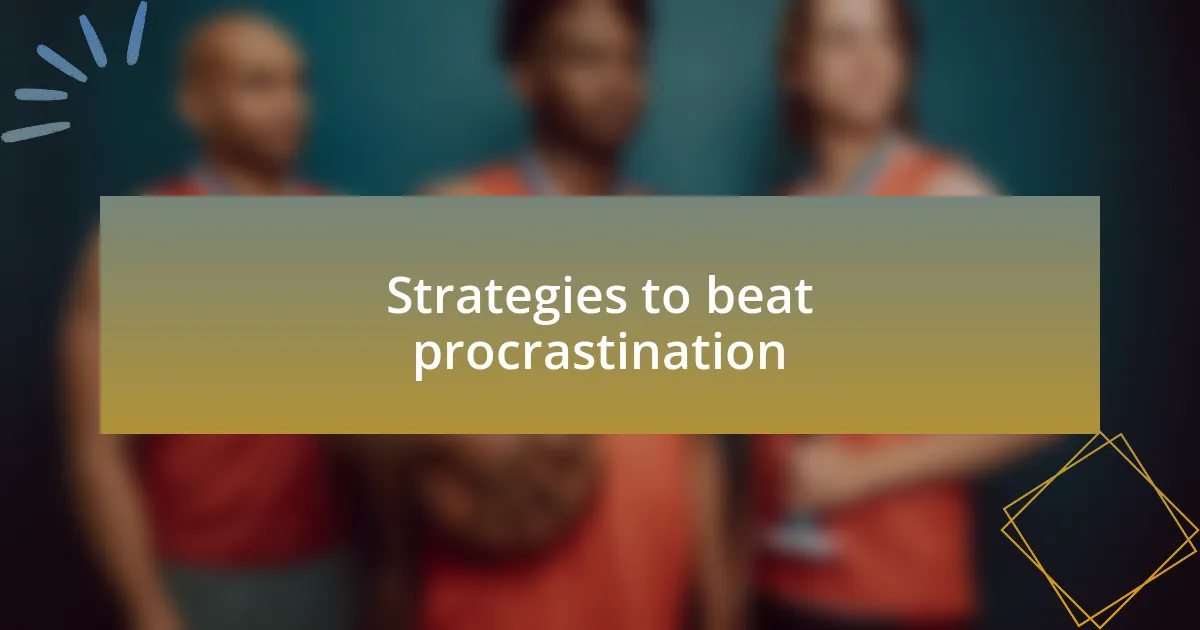
Strategies to beat procrastination
Finding effective strategies to beat procrastination can transform our creative output, especially in music. One technique that has consistently worked for me is breaking tasks into smaller, manageable chunks. For example, when I had to write lyrics for an upcoming song, I divided the process into brainstorming sessions for themes, drafting lines, and refining them. This approach made the task feel less daunting and allowed for a steady flow of creativity. Isn’t it amazing how tackling smaller parts can lead to a big-picture accomplishment?
I’ve also discovered the power of setting specific deadlines for myself. When I was working on a music project, I would often arbitrarily choose a launch date without much thought. But once I committed to a firm deadline, I felt a renewed urgency. It’s as though declaring a deadline ignited a spark within me, pushing me to prioritize my work. Have you ever experienced that rush when a deadline is looming? It’s a mix of pressure and motivation that can actually fuel productivity.
Lastly, I’ve learned to eliminate distractions, which can significantly curb procrastination. During one particularly chaotic period, I found myself scrolling through social media instead of practicing for a live show. I realized that setting specific times to check my phone—or even turning it off altogether—helped create an environment conducive to focus. Isn’t it interesting how a simple change in our surroundings can have such a profound impact on our ability to concentrate? By consciously creating a distraction-free space, I’ve been able to dive deeper into my music and harness my creativity more effectively.
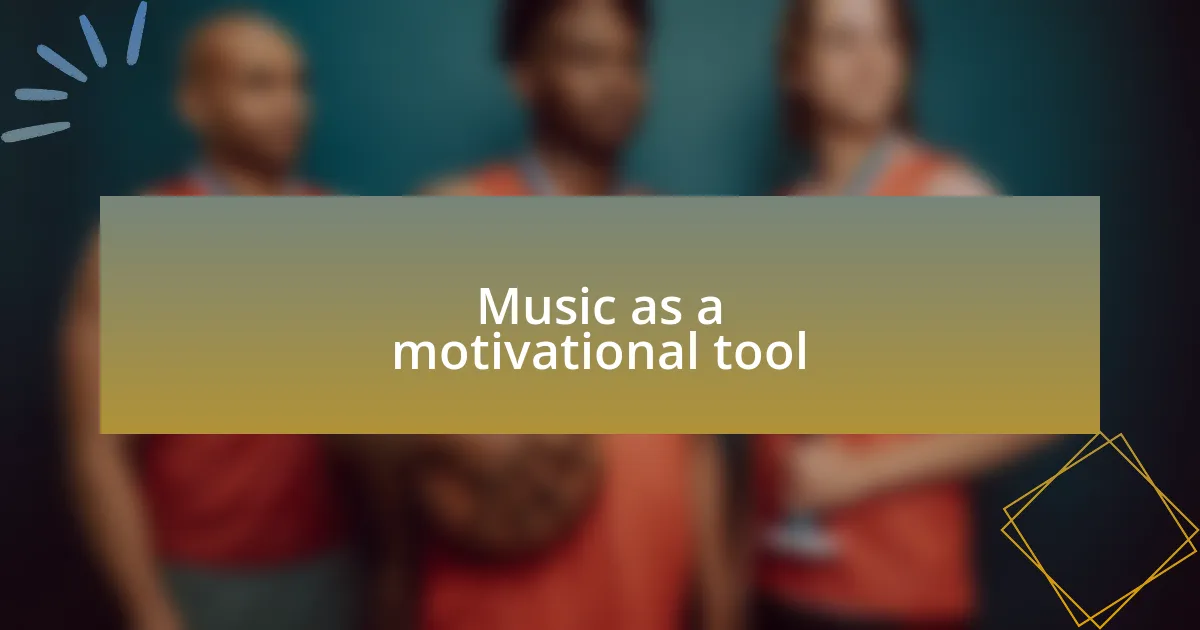
Music as a motivational tool
Music plays a vital role in my journey of overcoming procrastination. I’ve found that creating playlists tailored to specific tasks can really elevate my motivation. For instance, when I need to dive into songwriting, I curate a mix of upbeat tracks that energize me, pulling me into a creative zone. Have you ever noticed how certain songs can instantly uplift your mood and drive?
Another aspect I’ve discovered is how music can serve as a cue for productivity. There are days when I play the same album on repeat while working on projects. That familiar soundscape becomes a signal in my brain that it’s time to focus. I remember one day, fully immersed in the rhythm of a favorite artist; I was amazed at how much I accomplished. Isn’t it intriguing how music can transform our environment into a world where creativity thrives?
Additionally, I often find inspiration in musical lyrics and compositions. When I’m feeling stuck, listening to artists who tackle themes of perseverance helps reignite my passion. I recall a moment when I was reeling from self-doubt, and a powerful ballad resonated with my struggles. It motivated me to push through and finish my work. How often does music reflect our lives and fuel our ambitions? It turns out that melodies and harmonies can be more than just sound; they can be the drive behind our most productive moments.
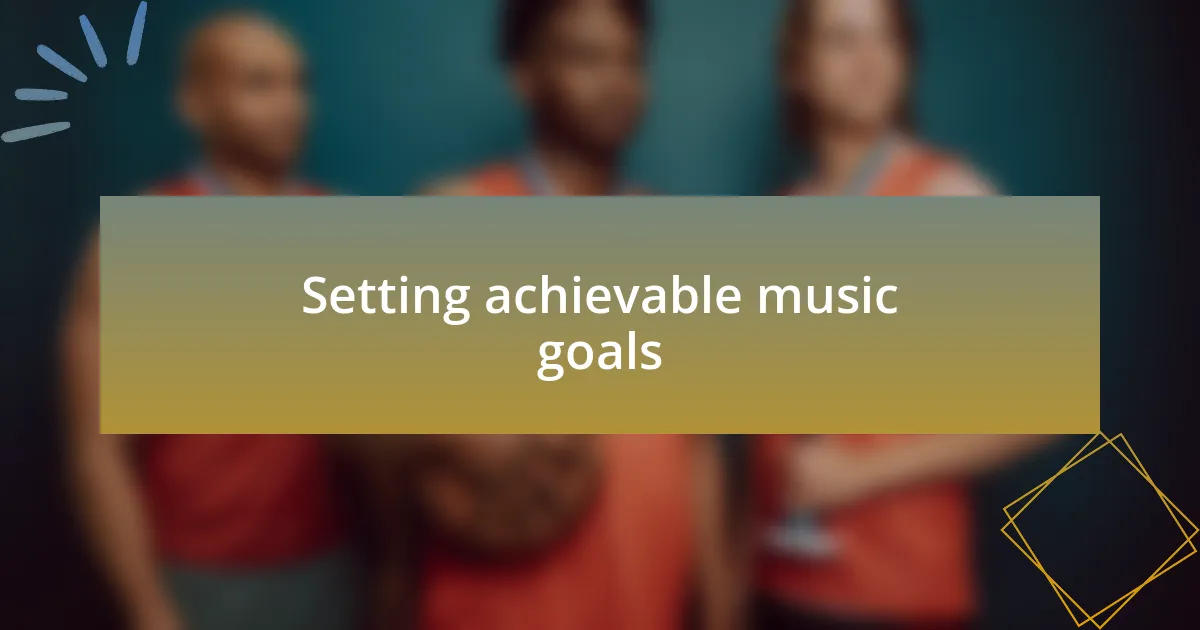
Setting achievable music goals
Setting achievable music goals can truly transform your creative process. When I began my journey as a musician, I realized that setting small, realistic goals was far more effective than lofty ambitions. For instance, instead of aiming to write an entire album, I focused on completing just one song each week. Have you ever noticed how breaking down a larger task makes it feel less daunting? This strategy not only kept me motivated but also allowed my creativity to flourish in manageable bursts.
Another key insight for me has been aligning my goals with my passion. I once set a goal to learn a new instrument by dedicating just 15 minutes each day. This short commitment felt attainable amid a busy schedule, and surprisingly, I was learning at a pace that kept me excited. What if we viewed our musical aspirations through the lens of enjoyment rather than pressure? By framing my practice as a joyful journey, I found it easier to stay committed and make steady progress.
Moreover, celebrating small victories along the way has been essential to my development. Each time I achieved a music goal, no matter how minor, I took a moment to reflect on my progress. For instance, after mastering a new chord progression, I would reward myself by playing my favorite song. Isn’t it amazing how acknowledging our accomplishments, no matter the size, can fuel our motivation? Such moments reaffirm the joy in our musical pursuits, enhancing the overall experience and helping me overcome procrastination.
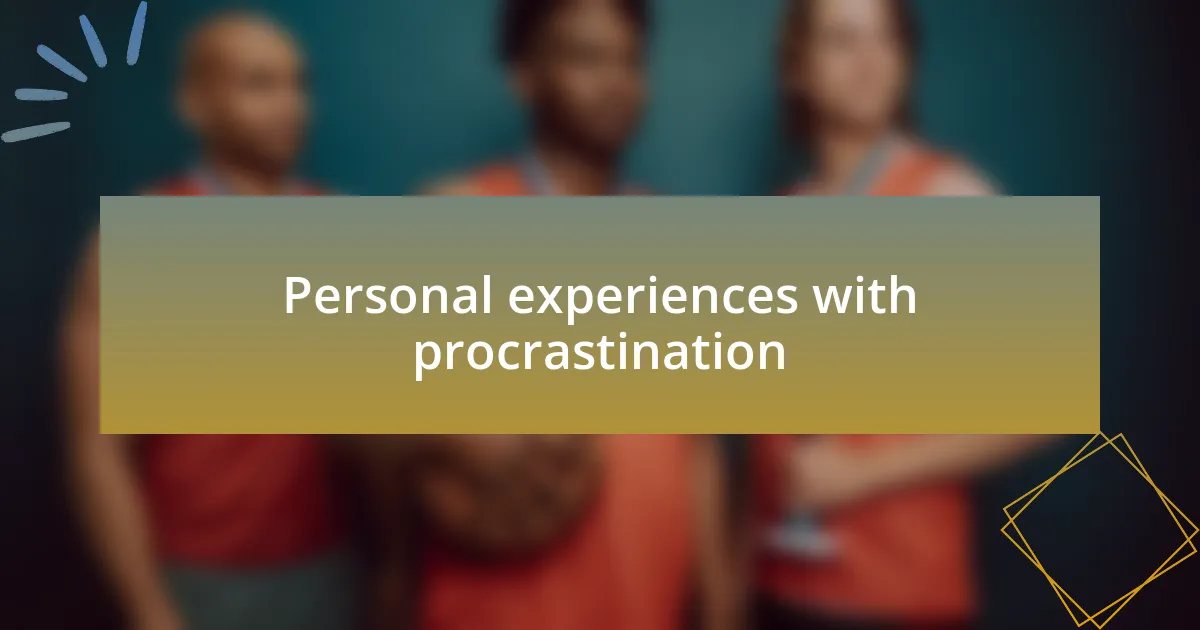
Personal experiences with procrastination
I’ve often found myself staring blankly at my instrument, feeling overwhelmed by the sheer amount of music I wanted to create. One day, I realized I was putting off practicing because I was so focused on the end result—a flawless performance or a perfect composition. Instead, I began approaching practice sessions like a casual jam with friends. Wouldn’t it be easier to enjoy the process rather than dread the outcomes? Shifting my mindset helped me engage more deeply with my music, and slowly, the procrastination faded.
There was this particular moment in my musical journey when I set a timeline to finish a song—but instead of pushing through, I spent weeks avoiding it. I vividly remember sitting in my room, feeling the weight of the unfinished work gnawing at my creativity. It dawned on me that waiting for inspiration wasn’t the answer; action was key. By allocating just ten minutes each day to play around with melodies, I discovered that breakthrough often comes from the simplest beginnings. Have you experienced that sense of liberation when you finally start? It’s a powerful reminder that momentum builds through consistent, small efforts.
Reflecting on those instances, I came to understand that procrastination is often tied to fear—fear of failure or not meeting expectations. I remember feeling anxious about sharing my compositions, which led to putting them off for far too long. Once I embraced vulnerability and allowed myself to share works-in-progress, the fear lessened. It’s interesting how connecting with others can motivate us to move forward. Can you relate to that feeling of relief when you finally take the plunge? I’ve found that vulnerability is not just a part of music; it’s a catalyst for growth.
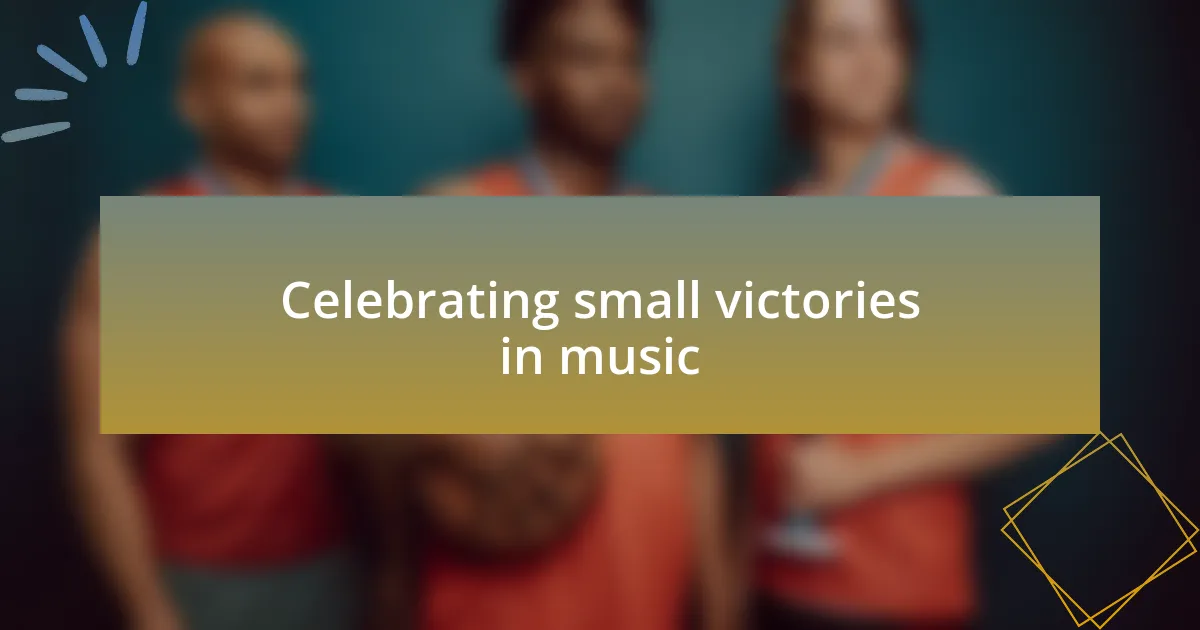
Celebrating small victories in music
Celebrating small victories in music is a practice that has transformed my journey as a musician. I remember the thrill of hitting the right note after days of struggle or finally nailing a tricky chord progression. Those little achievements, though seemingly minor, fueled my passion and reminded me that progress doesn’t always have to be monumental. Have you ever noticed how one small success can change your entire outlook on practicing?
There was a week when I decided to mark each practice session with a simple checkmark on a calendar. At first, it seemed trivial, yet after only a few days, I could see evidence of my commitment. Each mark represented not just time spent, but a small triumph over procrastination. It made me ask myself—why do we often overlook these tiny wins? They do instill a sense of accomplishment and can be incredibly uplifting, encouraging us to keep moving forward.
Whenever I complete a small task, like writing a few bars of music or experimenting with a new sound, I pause to acknowledge the effort. That moment of recognition feels like a celebration in itself. I’ve learned that these small victories create a rhythm in my music practice, much like the notes and beats I spend hours perfecting. How often do you celebrate your own small victories? I find that doing so has helped me build a healthier, more joyous relationship with my craft, turning every step into a reason to keep pursuing my passion.